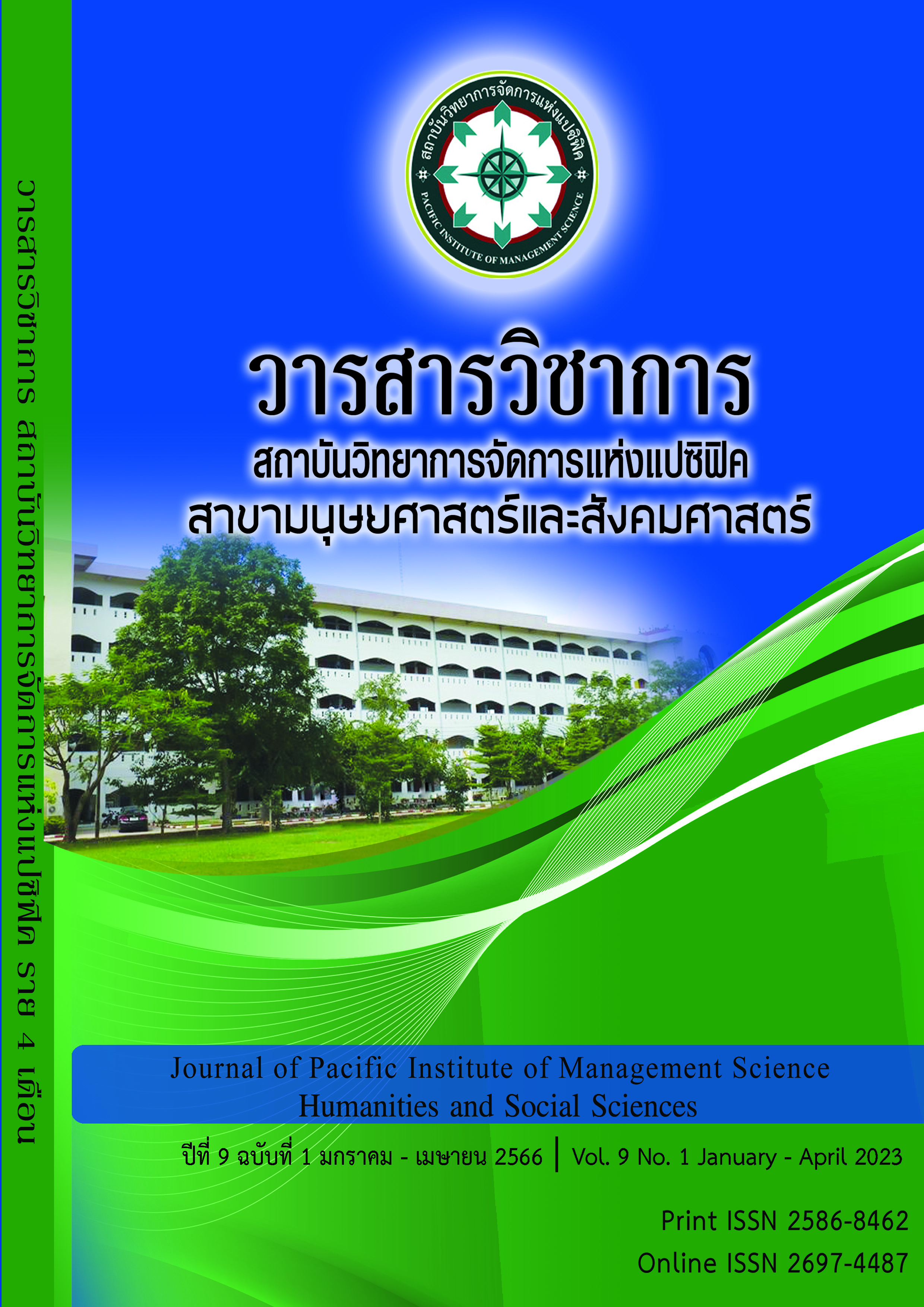Following in the footsteps of the King to Khok Nong Na Model in the local community sustainably of first year students Social Studies of Sisaket Rajabhat University
Keywords:
King's science, Project Integration Learning, Khok Nong Na Model, Local CommunityAbstract
The objectives of this research were 1) to develop and enhance learning of the King's Philosophy of Sufficiency Economy through Project Integration Learning (PIL) in the King's Learning Center. Sisaket Rajabhat University 2) to study the approach of applying the philosophy of sufficiency economy to sustainable economic recovery of the local community. in the form of Khok Nong Na of entrepreneurs who are self-reliant and able to help society The sample population is 30 students from Sisaket Rajabhat University and entrepreneurs who bring the philosophy of sufficiency economy to sustainable economic recovery of the local community. In the Khok Nong Na model, there were 10 people. The research model was qualitative research. Data were collected from in-depth interviews from key informants and group discussions. (Focus group discussion)
The results of the study were:
1) Learning the King's Philosophy of Sufficiency Economy through Project Integration Learning (PIL) of students It consists of the following learning steps: 1) title determination 2) question mapping 3) search, summary of knowledge and work piece creation 4) integrated linkage evaluation 5) portfolio preparation 6) public presentation In order from the King's Learning Center of Sisaket Rajabhat University, it was found that the King's Philosophy of Sufficiency Economy was used in Sisaket Province, consisting of Project to promote the processing of shallots into shallot tea Promotion of herbal soap making project Project to promote durian processing by using various techniques and processes Project to promote the production of organic fertilizer pellets, betel nut mat, herb fish Seasoned Khao Lam and fresh fish products Project to promote and upgrade the finished Nam Nua community products projects for development, promotion and processing of economic crops, etc
2) Guidelines for applying the Sufficiency Economy Philosophy to Sustainable Restoration of the Foundation of Local Communities in the form of Khok Nong Na of entrepreneurs who rely on themselves and help society It is agriculture that emphasizes self-reliance. It is the creation and development of their agricultural land to be ready to be a source of food production and to be prepared to cope with the Changes from the outside world, whether it is an economic crisis even if there is no income from the sale of products or is it a drought It doesn't rain in season, so farmers still have water sources in their areas that can be utilized. return to nature It is a food source for various animal species. Create balance for nature and human beings to be able to live together in a supportive way, enabling people in the community to be able to rely on themselves with food, supplies and housing only. But it also makes the environment both soil and water better. fresh air which can be applied by everyone in urban and rural areas for sustainable better quality of life
References
กรมการพัฒนาชุมชน. (2563). วิสัยทัศน์/พันธกิจ/ยุทธศาสตร์. สืบค้นเมื่อวันที่ 20 พฤษภาคม2564 เข้าถึงได้จาก https://www.cdd.go.th
ชยุต อินทร์พรหม. (2561). เศรษฐกิจพอเพียงกับการเกษตรทฤษฎีใหม่ประยุกต์ ทํานา 1 ไร่ ได้ 1. แสนวารสารพัฒนาสังคม สถาบันบัณฑิตพัฒนบริหารศาสตร์, 20(2), 1-15.
นิสากร กรุงไกรเพชร, อริสรา ฤทธิ์งาม และ ชรัญญากร วิริยะ. (2559). รูปแบบการขับเคลื่อนชุมชนสุขภาวะที่ท่ามะนาว. วารสารพยาบาล มหาวิทยาลัยบูรพา, 24(3). 34-46.
พระครูศรีปริยัตยารักษ์ (ประสงค์ กิตติปญโญ). (2560). รูปแบบการสร้างเครือข่ายหมู่บ้านรักษาศีล 5เพื่อการพัฒนาคุณภาพชีวิตของประชาชนจังหวัดนครราชสีมา.ปริญญานิพนธ์ การศึกษาดุษฎีบัณฑิต, มหาวิทยาลัยมหาจุฬาลงกรณราชวิทยาลัย
พระฐาปกรณ์ รตนโชโต (สุปัญญารัตน์). (2561). รูปแบบการผลิตและการจัดการการเกษตรแบบพอเพียงกับดุลยภาพชีวิตของเกษตรกรในจังหวัดบุรีรัมย์. ปริญญานิพนธ์ การศึกษาดุษฎีบัณฑิต,มหาวิทยาลัยมหาจุฬาลงกรณราชวิทยาลัย
พระณรงค์เดช อธิมุตโต (เดชาดิลก), (2560). รูปแบบการพัฒนาศูนย์การเรียนรู้โรงเรียนวิถีพุทธ. ปริญญานิพนธ์ การศึกษาดุษฎีบัณฑิต, มหาวิทยาลัยมหาจุฬาลงกรณราชวิทยาลัย
พระปลัดธนากร สนุตมโน (เพราะถะ), (2561). ได้ศึกษารูปแบบการพัฒนาชุมชนแบบมีส่วนร่วมเชิงพุทธของเทศบาลเมืองวังสะพุง จังหวัดเลย. ปริญญานิพนธ์ การศึกษาดุษฎีบัณฑิต, มหาวิทยาลัยมหาจุฬาลงกรณราชวิทยาลัย
มูลนิธิชัยพัฒนา. (2542).ทฤษฎีใหม่. สืบค้นเมื่อวันที่ 20 พฤษภาคม 2564เข้าถึงได้จาก https://www.chaipat.or.th
ไม่ปรากฏผู้แต่ง. (2559). การกักเก็บน้ําในโคก หนอง นา โมเดล ตัวอย่าง 10 ไร่. สืบค้นเมื่อวันที่20 พฤษภาคม 2563 เข้าถึงได้จาก www.monmai.com
รัชนีวรรณ จีนธรรม, ปัณณ์รภัส ถกลภักดี และอรวรรณ ภัสสรศิริ. (2561). การพัฒนารูปแบบการจัดการเรียนรู้สิ่งแวดล้อมตามหลักปรัชญาของเศรษฐกิจพอเพียงของเครือข่ายกสิกรรม ธรรมชาติ. วารสาร มจร พุทธปัญญาปริทรรศน์ มหาวิทยาลัยราชภัฏวไลยอลงกรณ์ในพระบรม ราชูปถัมภ์ 3(2). สืบค้นเมื่อวันที่ 20 พฤษภาคม 2564 เข้าถึงได้จาก dhttps://so03.tcithaijo.org/index.php/jmbr/article/download/148190/109077/
วิวัฒน์ ศัลยกําธร. (2562). ชุดถอดคําครู : วิชาหลักกสิกรรมธรรมชาติ. สืบค้นเมื่อวันที่20 พฤษภาคม 2564 เข้าถึงได้จาก https://pubhtml5.com/vrrw/amiu/basic.
สํานักงานคณะกรรมการพิเศษเพื่อประสานงานโครงการอันเนื่องมาจากพระราชดําริ (สํานักงาน กปร.). (2552). เศรษฐกิจพอเพียงแนวคิดสู่การประยุกต์ใช้ที่ยั่งยืน. (พิมพ์ครั้งที่ 1)กรุงเทพฯ. บริษัท เอเชีย แปซิฟิค ออฟเซ็ท จํากัด
สํานักงานพัฒนาพื้นที่ปฏิรูปที่ดิน (ไม่ปรากฏปีที่พิมพ์). แนวทางการพึ่งตนเองในการจัดเก็บน้ําระดับไร่นาตามแนวทางศาสตร์พระราชา ในเขตปฏิรูปที่ดิน. สํานักงานการปฏิรูปที่ดินเพื่อการเกษตรกรรม (ส.ป.ก.) กระทรวงเกษตรและสหกรณ์, 6 - 12.
สํานักเสริมสร้างความเข้มแข็งชุมชน กรมการพัฒนาชุมชน. (2563). แนวทางการดําเนินงานโครงการพัฒนาพื้นที่ต้นแบบการพัฒนาคุณภาพชีวิตตามหลักทฤษฎีใหม่ประยุกต์สู่ โคก หนอง นา โมเดล. สืบค้นเมื่อวันที่ 20 พฤษภาคม 2564 เข้าถึงได้จาก https://roiet.cdd.go.th/wpcontent/uploads/sites/48/2020/08.compressed.pdf.
สุภาวดี ขุนทองจันทร์. (2541). เพิ่มทุนมนุษย์ด้วย “จิตสาธารณะ”. วารสารสังคมพัฒนา มหาวิทยาลัยบูรพา, 36(4), 63-70.
อัษฎาวุฒิ พฤฒิวรวงศ์. (2563). การน้อมนําปรัชญาเศรษฐกิจพอเพียงประยุกต์สู่ “โคก หนอง นาโมเดล”. สืบค้นเมื่อวันที่ 20 สิงหาคม 2564 เข้าถึงได้จาก http://www3.ru.ac.th/mpaabstract/files/256316298601726214832046.pdf
Downloads
Published
Issue
Section
License
Copyright (c) 2023 Pacific Institute of Management Science

This work is licensed under a Creative Commons Attribution-NonCommercial-NoDerivatives 4.0 International License.
บทความที่ได้รับการตีพิมพ์เป็นลิขสิทธิ์ของ สถาบันวิทยาการจัดการแห่งแปซิฟิค
ข้อความที่ปรากฏในบทความแต่ละเรื่องในวารสารวิชาการเล่มนี้เป็นความคิดเห็นส่วนตัวของผู้เขียนแต่ละท่านไม่เกี่ยวข้องกับสถาบันวิทยาการจัดการแห่งแปซิฟิค และคณาจารย์ท่านอื่นๆในสถาบันฯ แต่อย่างใด ความรับผิดชอบองค์ประกอบทั้งหมดของบทความแต่ละเรื่องเป็นของผู้เขียนแต่ละท่าน หากมีความผิดพลาดใดๆ ผู้เขียนแต่ละท่านจะรับผิดชอบบทความของตนเองแต่ผู้เดียว







